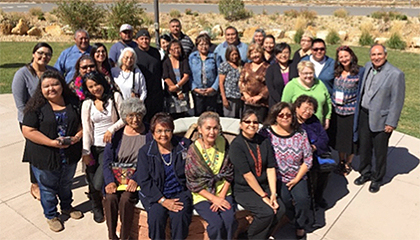Just Published! Report on the Community Health Representative Policy Summit II
 The report “Gaining Momentum for Policy Action” describes findings and recommendations that emerged from the CHR Policy Summit in three key areas.
The report “Gaining Momentum for Policy Action” describes findings and recommendations that emerged from the CHR Policy Summit in three key areas.
Voluntary Certification - Overwhelmingly, the CHRs support certification of the CHW workforce and viewed it as a means to accomplish a number of objectives: standardizing and legitimizing the workforce; Community Health Representative establishing reimbursement through Stakeholder at the September 2016 Medicaid; differentiating between other Policy Summit workforces; and potentially increasing CHR salaries. CHRs also favored identifying core competencies and standardizing the training. They also wanted the certification process to consider grandfathering CHRs who have had years of experience and for the certification to be recognized across state lines.
Workforce Identity and Development - CHRs identified many roles that they perform including bridging the gap between patients and the health/social service system, providing health education and advocating for their patients and community. They possess unique qualities that set them apart from other professionals: the ability to speak local indigenous languages; possessing knowledge of their clients’ cultures and religions - this facilitates a trusting relationship. Lastly, CHRs expressed that they are undervalued in the health care system, thus may be underutilized and inadequately compensated.
Vision for Healthy Communities - CHRs indicated that better use of laptops and electronic health records could aid in their work. Basic needs such as improved office space and transportation were also cited. Factors that distract CHRs from their vision include duties and time management overload, lack of support and integration, inadequate program funding and leadership involvement, and high poverty. Successful strategies identified included cross-sector collaboration, specialized training, and CHR forums. The forum was possible thanks to the collaboration and sponsorship of the following organization: Arizona Advisory Council on Indian Health Care; Inter Tribal Council of Arizona, Inc., ADHS, Hualapai Tribe; AzPRC/Az Rural Women’s Health Network; Navajo Nation Gaming Enterprise.



